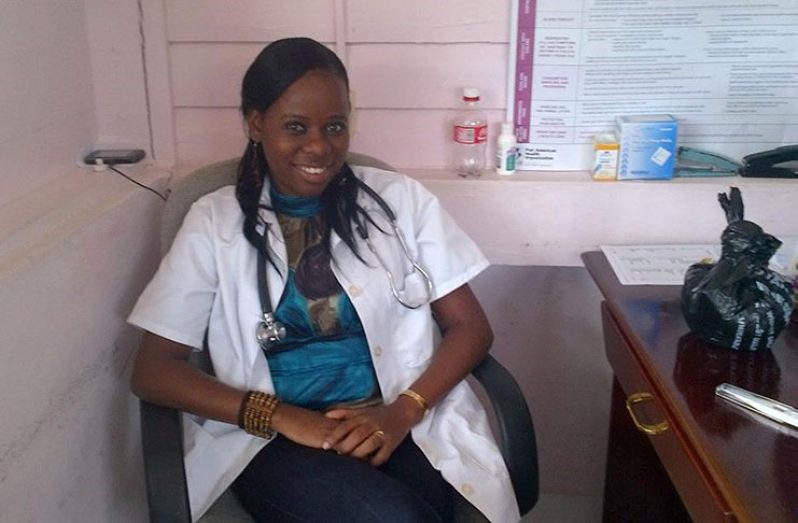– highly treatable when detected early
By M Margaret Burke
THE second leading cause of cancer mortality in women in Guyana is cervical cancer. And this type of cancer mostly affects women in their prime reproductive and productive ages – between the ages of 18 and 35, even though it can and does affect women who are much older and also younger women too.
Many times when women are diagnosed as having cervical cancer there is a certain amount of panic and confusion – for them, as well as their family members; people choose to be doubtful; they question, “How can this be?”, then there is a certain amount of indignation – the blaming of a significant other, and the like.

carry out the Pap smear test
However, studies done by numerous international organisations, including the PAHO/WHO and CDC have shown that the main barriers to the use of protective measures by women against cervical cancer is their very level of knowledge about this health issue and how it can be preventive.
100 per cent preventable and treatable
In a recent interview with Dr Latoya Gooding, President of the Giving Hope Foundation, she told the Guyana Chronicle, “Cervical cancer is 100 per cent preventable and treatable.” She noted that the women who are most affected are women below the age of 35 years; our Amerindian women; women that are having unprotected sex; women that are immune compromised or immune suppressed (such as HIV/AIDS positive patients or diabetic persons); also persons that are infected with the HPV virus.
“We find women older than 35 with cervical cancer; we find women much younger, 18 or so with cervical cancer.
“According to statistics, what we’ve been seeing is women below 35, but it can come in both age ranges. And while it is not a sexual transmitted virus, it is transmitted, because of the HPV virus – this is the virus that is transmitted sexually; and out of all of the HPV strains, they are two that can cause cervical cancer.
“So basically what Guyana had been doing is that they are offering the HPV vaccine to our young women – age nine to 25 years old that are not sexually active. But ideally we should be giving it to both boys and girls because while it can cause cervical cancer in women, in men it can cause oral cavity cancer,” she said
National cancer screening programme
Dr Gooding explained that through a national cancer screening programme the government is doing the VIA (visual inspection with acetic acid), through which they will know whether it is cancerous, pre-cancerous and then they will do further treatment.
“The VIA is a one-stop shop approach, where they do the VIA and if it is positive right there and then they can do cryotherapy (there is where they freeze the cervix and they just remove it) – right there and then.
“There is also the Pap smear, where you can go looking for the cervical cancer, but that is not a one-stop shop. As you do the Pap smear today, you wait about three weeks to get back results and then you take it from there.”
The speculum is the instrument used to carry out the Pap smear test
She said that through her foundation (Giving Hope Foundation) they suggest that persons do the Pap smear every three years, “but only if you have likely risk factors; that someone close to you, like your sister died from cervical cancer then you can do it every year; or if we found that there is inflammatory cells or metaplastic cells we tell you to repeat it in three months, but it depends.”
First World countries
Dr Gooding explained that in first world countries they are using the HPV testing that is not here in Guyana as yet, which is another way of detecting cervical cancer.
“Basically the treatment available here in Guyana are the radiotherapy and the brachytherapy, which is done at the Cancer Institute and there is the public/private partnership; also there is chemotherapy, which is done at the Georgetown Public Hospital oncology department and there is surgery.
“Through the Giving Hope Foundation, what we do is free cancer screening monthly; we screen for breast cancer; we screen for cervical cancer; we screen for prostate cancer and we do blood pressure; blood sugar; eye testing and others.
“We offer both VIA and Pap smear and then we do the follow-up. Depending on what the result is, that how we approach it. If the Pap smear is positive, then we do an immediate referral to the Georgetown Public Hospital; if it’s negative, well then we just monitor you, if it is yearly or every two years,” she offered.
HPV vaccine FDA approved
Dr Gooding said that so far what they have been finding is that a large percentage of the female population have never had a Pap smear done in their lifetime.
“Basically, that’s what we are trying to advocate the HPV vaccination, where we are trying to vaccinate our young ladies so that they could prevent cervical cancer.’
When quizzed by Guyana Chronicle, she said that while there are side effects for everything, “but on the whole in Guyana right now many people feel that the drug is not FDA approved, but it is FDA approved and it is not a trial-run Guyana is doing, it is the real thing. The same that they are using in the USA, is the same thing they are using right here. So while most women say that they are not taking their daughters to be guinea pigs, it’s the real thing,” Dr Gooding assured.
She emphasised, “Pap smear is for screening or testing; how to prevent it [cervical cancer] would be the vaccine – the HPV vaccine and using a condom; abstaining from sex, if you want to say that; not having more than one sexual partner; bit is basically protection with a condom.”
Public education
The general conclusion seems to be that there is not as high a level of awareness by women in Guyana about cervical cancer, Pap smear testing and the HPV vaccine; Thus a serious need for these women to receive more public education and be informed about these procedures, in an effort to improve their health by way of preventive measures.
The fact is that cervical cancer is in fact one of the few cancers that can be prevented, but that its prevention is hinged on diagnosis of the precancerous lesions, which makes the emergence of cancer almost impossible; the mortality rate of women, especially in Third world countries where it is still far too high. (mercilinburke2017@gmail.com)




.png)









